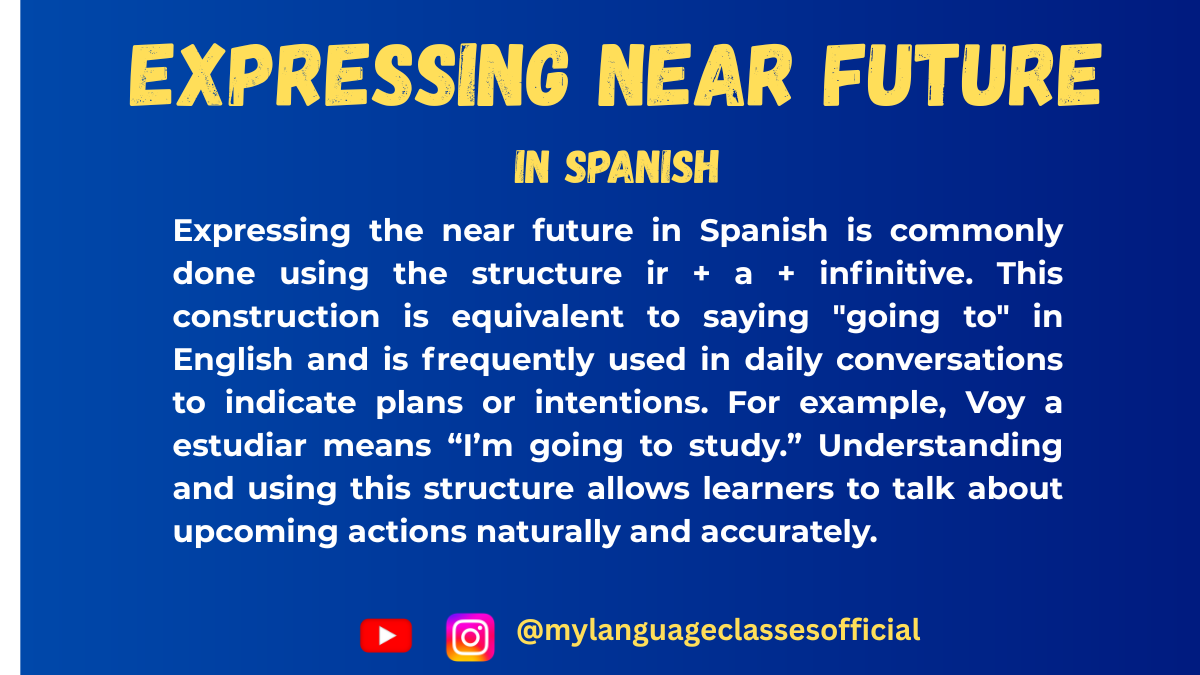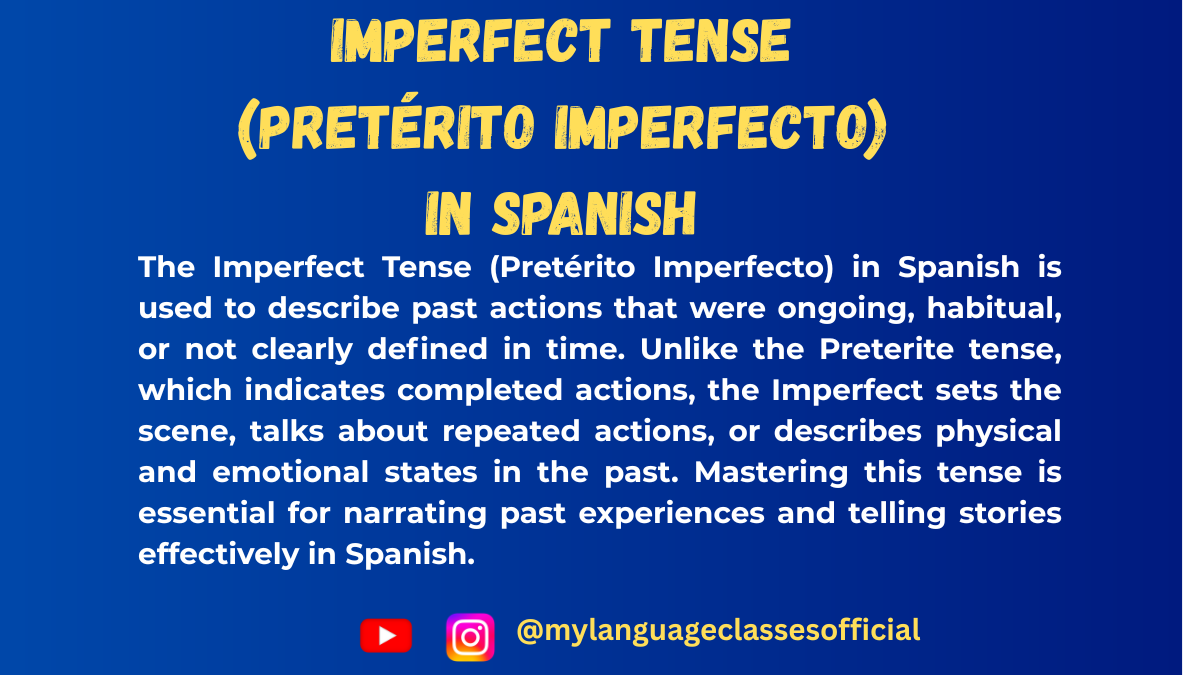Your cart is currently empty!
Tag: Learning Spanish verbs
-

Ir a + Infinitive: Expressing Near Future in Spanish
In Spanish, the construction “Ir a + infinitive” is commonly used to express actions that will happen in the near future. This is equivalent to the English “going to + verb” structure. It is widely used in spoken and written Spanish and is easier to learn compared to the simple future tense.
Formation of “Ir a + Infinitive”
The structure consists of three elements:
- The verb “ir” (to go) conjugated in the present tense.
- The preposition “a” (to).
- An infinitive verb (unconjugated verb).
Conjugation of “Ir” in Present Tense:
Subject Pronoun Conjugation of “Ir” Yo voy Tú vas Él/Ella/Usted va Nosotros/as vamos Vosotros/as vais Ellos/Ellas/Ustedes van Sentence Structure:
Subject + Ir (conjugated) + a + Infinitive Verb
Example Sentences:
- Voy a estudiar. (I am going to study.)
- Vamos a viajar a México. (We are going to travel to Mexico.)
- Ellos van a comprar una casa. (They are going to buy a house.)
Usage of “Ir a + Infinitive”
1. Near Future Actions
Used to express something that is about to happen soon.
- Voy a llamar a mi madre. (I am going to call my mother.)
- Ella va a cocinar la cena. (She is going to cook dinner.)
2. Intentions or Plans
Used when someone has planned to do something.
- Vamos a ver una película esta noche. (We are going to watch a movie tonight.)
- Voy a aprender español este año. (I am going to learn Spanish this year.)
3. Predictions Based on Evidence
Used when there is evidence that something is about to happen.
- Va a llover. (It is going to rain.)
- El bebé va a llorar. (The baby is going to cry.)
4. Giving Commands or Warnings
Used to give warnings or strong suggestions.
- Vas a romper el vaso. (You are going to break the glass.)
- Van a llegar tarde si no se apuran. (You all are going to be late if you don’t hurry.)
Articles, Gender, and Plural Considerations
When using “Ir a + Infinitive,” remember:
- Definite Articles (el, la, los, las) and Indefinite Articles (un, una, unos, unas) should match the noun in gender and number.
- Example: Voy a comprar una bicicleta. (I am going to buy a bicycle.)
- Example: Vamos a visitar el museo. (We are going to visit the museum.)
- Verb agreement: The conjugation of “ir” changes based on the subject.
- The infinitive verb does not change regardless of the subject.
Common Verbs Used with “Ir a + Infinitive”
Here is a list of common verbs and their “Ir a + Infinitive” forms:
Infinitive Verb Meaning “Ir a + Infinitive” Example Comer To eat Voy a comer pizza. (I am going to eat pizza.) Beber To drink Vas a beber agua. (You are going to drink water.) Estudiar To study Ella va a estudiar matemáticas. (She is going to study mathematics.) Viajar To travel Vamos a viajar a España. (We are going to travel to Spain.) Comprar To buy Van a comprar un coche. (They are going to buy a car.) Hacer To do/make Voy a hacer mi tarea. (I am going to do my homework.) Tener To have Vas a tener una sorpresa. (You are going to have a surprise.) Llegar To arrive Ella va a llegar temprano. (She is going to arrive early.) Jugar To play Vamos a jugar fútbol. (We are going to play soccer.) Dormir To sleep Van a dormir temprano. (They are going to sleep early.) Regular and Irregular Verbs in “Ir a + Infinitive”
All verbs, whether regular or irregular, remain in the infinitive form after “a.”
Regular Verbs (AR, ER, IR Verbs)
- Hablar (to speak): Voy a hablar con mi amigo. (I am going to speak with my friend.)
- Comer (to eat): Vamos a comer paella. (We are going to eat paella.)
- Vivir (to live): Ellos van a vivir en Barcelona. (They are going to live in Barcelona.)
Irregular Verbs
- Hacer (to do/make): Voy a hacer la tarea. (I am going to do the homework.)
- Tener (to have): Ella va a tener una fiesta. (She is going to have a party.)
- Poder (to be able to): Van a poder salir temprano. (They are going to be able to leave early.)
Conclusion
The “Ir a + Infinitive” structure is one of the most practical and commonly used ways to express the near future in Spanish. It is simple to form and widely understood in all Spanish-speaking regions. By practicing this structure with different verbs, you can quickly improve your Spanish fluency and express future plans with confidence.
Now that you understand how to use “Ir a + Infinitive”, start practicing by forming your own sentences!
If you enjoyed this lesson, be sure to check out more posts like this on my blog at My Language Classes. Don’t forget to subscribe my YouTube channel and follow me on Instagram for the latest language learning tips and lessons. Leave a comment below to share your thoughts, or ask any questions you have.
Happy learning! 😊
-

Imperfect Tense (Pretérito Imperfecto) in Spanish
The Pretérito Imperfecto is one of the past tenses in Spanish, used to describe habitual actions, ongoing events, and situations in the past. It provides context or background without indicating when the action specifically started or ended. Below, we’ll explore its use, conjugation for regular and irregular verbs, and common expressions.
When Do We Use the Pretérito Imperfecto?
- Describing habitual or repeated actions in the past
- Example: Cuando era niño, jugaba al fútbol todos los días.
(When I was a child, I played soccer every day.)
- Example: Cuando era niño, jugaba al fútbol todos los días.
- Setting the scene or providing background information
- Example: Hacía frío y nevaba cuando llegué a casa.
(It was cold, and it was snowing when I arrived home.)
- Example: Hacía frío y nevaba cuando llegué a casa.
- Describing mental states, emotions, or physical conditions in the past
- Example: Estaba cansado después del trabajo.
(I was tired after work.)
- Example: Estaba cansado después del trabajo.
- Actions that were in progress in the past (without focusing on their start or end)
- Example: Leía un libro mientras ella cocinaba.
(I was reading a book while she was cooking.)
- Example: Leía un libro mientras ella cocinaba.
- Telling time and age in the past
- Example: Eran las cinco de la tarde.
(It was five in the afternoon.)
Tenía veinte años en ese momento.
(I was twenty years old at that time.)
- Example: Eran las cinco de la tarde.
Forming the Pretérito Imperfecto
The conjugation of regular verbs in the imperfect tense follows specific patterns for each verb group: -ar, -er, and -ir.
Regular Verbs
- -AR VerbsSubjectEndingExample (hablar)Yo-abahablabaTú-abashablabasÉl/Ella-abahablabaNosotros-ábamoshablábamosVosotros-abaishablabaisEllos-abanhablaban
- -ER VerbsSubjectEndingExample (comer)Yo-íacomíaTú-íascomíasÉl/Ella-íacomíaNosotros-íamoscomíamosVosotros-íaiscomíaisEllos-íancomían
- -IR Verbs
Conjugation is identical to -er verbs.- Example: vivir
vivía, vivías, vivía, vivíamos, vivíais, vivían
- Example: vivir
Key Irregular Verbs in the Pretérito Imperfecto
- Ir (to go)
- Iba, ibas, iba, íbamos, ibais, iban
- Ser (to be)
- Era, eras, era, éramos, erais, eran
- Ver (to see)
- Veía, veías, veía, veíamos, veíais, veían
Things to Keep in Mind
- Articles and Gender: When describing objects or actions, make sure articles (el, la, los, las) match the noun’s gender and number. For example:
- El sol brillaba. (The sun was shining.)
- Las estrellas iluminaban el cielo. (The stars lit up the sky.)
- Context and Time Expressions: Words like siempre (always), a menudo (often), cuando era niño/a (when I was a child), mientras (while), and todos los días (every day) are often used with the imperfect tense.
Common Expressions with Pretérito Imperfecto
- Cuando era niño/a – When I was a child
- Cuando era niña, me encantaba jugar con muñecas.
(When I was a little girl, I loved playing with dolls.)
- Cuando era niña, me encantaba jugar con muñecas.
- Todos los días – Every day
- Todos los días iba a la escuela a pie.
(Every day I walked to school.)
- Todos los días iba a la escuela a pie.
- Siempre – Always
- Siempre veía la televisión después de la cena.
(I always watched TV after dinner.)
- Siempre veía la televisión después de la cena.
- A menudo – Often
- A menudo visitábamos a nuestros abuelos los domingos.
(We often visited our grandparents on Sundays.)
- A menudo visitábamos a nuestros abuelos los domingos.
- Mientras – While
- Mientras ella cocinaba, él ponía la mesa.
(While she was cooking, he was setting the table.)
- Mientras ella cocinaba, él ponía la mesa.
Common Verbs in Pretérito Imperfecto with Examples
- Hablar (to talk)
- Yo hablaba con mis amigos cada tarde.
(I used to talk with my friends every afternoon.)
- Yo hablaba con mis amigos cada tarde.
- Comer (to eat)
- Nosotros comíamos juntos todos los sábados.
(We ate together every Saturday.)
- Nosotros comíamos juntos todos los sábados.
- Vivir (to live)
- Ellos vivían en Madrid en los años 90.
(They lived in Madrid in the 90s.)
- Ellos vivían en Madrid en los años 90.
- Estar (to be)
- Él estaba feliz en esa época.
(He was happy at that time.)
- Él estaba feliz en esa época.
- Leer (to read)
- Ella leía un libro cuando la llamé.
(She was reading a book when I called her.)
- Ella leía un libro cuando la llamé.
The Pretérito Imperfecto is a versatile tense that captures the nuances of the past in Spanish. By practicing its conjugation, understanding its context, and incorporating common expressions, you’ll master its use in no time!
If you enjoyed this lesson, be sure to check out more posts like this on my blog at My Language Classes. Don’t forget to subscribe my YouTube channel and follow me on Instagram for the latest language learning tips and lessons. Leave a comment below to share your thoughts, or ask any questions you have.
- Describing habitual or repeated actions in the past
